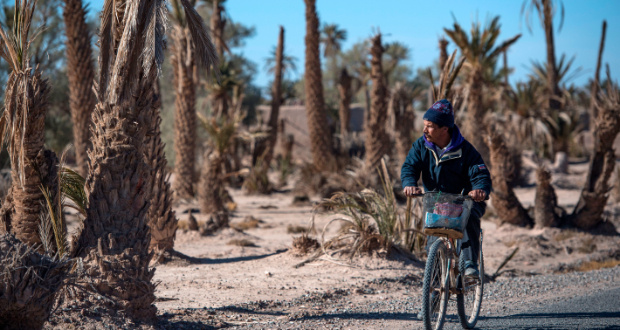Policy awareness about the challenges of climate change in the Middle East and North Africa (MENA) region has been on the rise, especially with Egypt hosting the 27th Conference of the Parties to the United Nations Framework Convention on Climate Change (COP27) in 2022 and the United Arab Emirates (UAE) hosting COP28 in 2023. The previously dominant narrative in MENA public and political spaces—that addressing climate change is a luxury that cannot be attended to in countries facing constant turmoil—has receded. The devastating impacts of climate change, ranging from high temperatures and extreme weather events in the Middle East to declining water resources and eroded coastal land in North Africa, have imposed their urgency on both citizenries and polities.
Equally emerging as urgent policy priorities have been the correlations of climate change, societal vulnerabilities, and governance deficits. Research has shown that in order to devise climate adaptation strategies that can facilitate equitable political power sharing among relevant stakeholders and address the socioeconomic struggles of vulnerable populations, climate governance must be approached from a political economy perspective, which may pose a problem for MENA countries.
In countries facing long-standing socioeconomic crises—poverty, unemployment, high inflation rates, population growth, and widening gaps between rich and poor population segments as well as between urban and rural localities—the impacts of climate change have exacerbated societal vulnerabilities. The weak, the needy, the unprotected, and the marginalized in the MENA region all have been greatly affected. According to the World Bank report on the impacts of climate change on poverty, poor and socioeconomically disadvantaged population segments are mostly at risk should governments fail to adequately tackle climate mitigation and adaptation.
Meanwhile, chronic governance deficits have made it difficult for MENA countries to mitigate and adapt to the impacts of climate change. These deficits include the persistence of undemocratic policymaking processes; the systematic exclusion of wide segments of MENA populations in favor of consolidating power and influence in the hands of the ruling establishments; the lack of transparency and accountability in resource and financial allocation matters and in policy implementation; and the restrictive nature of public spaces, which undermines the free flow of information and freedoms of expression and associations. Moreover, climate-change-induced societal vulnerabilities have also aggravated governance deficits in the region.
Several key questions have driven the research work that led to this series on climate, vulnerability, and governance:
- How has poor governance in MENA countries contributed to a lack of inclusivity and action, as well as structural deficiencies in countries’ declared commitments such as those related to resilient infrastructure, economic opportunity, and human security?
- What are the most significant short-term and long-term impacts of climate change at both institutional and individual levels that allow for an exploration of the relationships between climatic hazards, slow-onset hazards, governance, and vulnerability? Which are preexisting and therefore exacerbated by climate change, and which are new vulnerabilities that are a direct result of climate change and poor governance?
- What is the role of civil society in driving climate change action at the country and regional levels? How does the lack of engagement between governments and civil society actors in MENA limit climate adaptation efforts and undermine the representation of vulnerable communities, specifically women, minorities, and low-income individuals, in policymaking processes?




